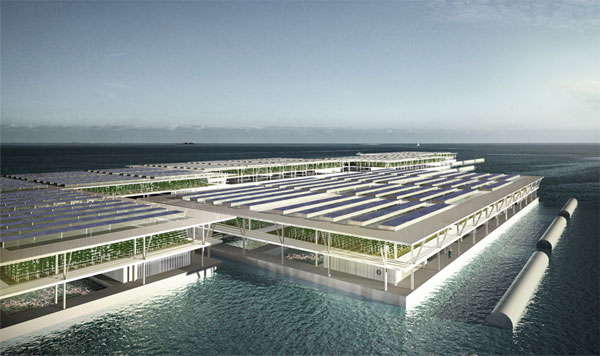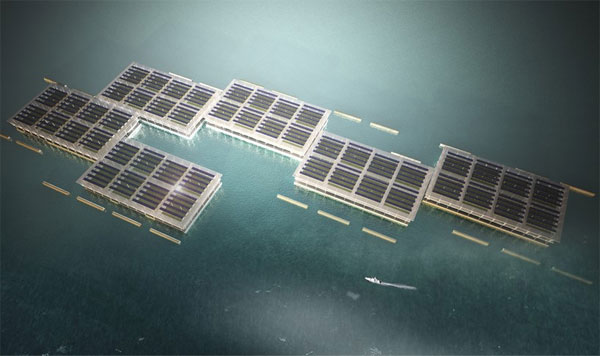Giant floating farms grow vegetables with sea water
This model of growing vegetables and fish without freshwater can provide 10 tons of food each year.
Model of growing vegetables with sea water
The architects in Spain are planning to design a three-story floating farm , which can produce nearly 10 tons of food each year, helping meet the growing food needs of the world.
This solar-powered farm complex will not use fresh water, but filter seawater to irrigate the plants above, while fish are reared, forming a sustainable system that can produce parts. Big foods for healthy meals.

Three-story farm design on the water surface of Spanish engineers.(Photo: Forward Thinking Architecture).
"This is a serious and feasible solution. We are not aiming to address human hunger or replace traditional agriculture. The motivation behind the project is to open a new initiative that can support Current production methods, in order to reduce the risk of food shortages in many regions around the globe, " Science Alert yesterday quoted a group of architects at Forward Thinking Architecture.
This is not the first time the idea of a floating farm has been given. Last year, a group of independent architects in Spain proposed a higher floating farm version. Japanese and Indian engineers are also building solar power generators floating on the water. The difference is that the new design includes a miniature ecosystem that can produce many different types of vegetables.
Under the plan, the top floor of the farm will be covered with solar panels and sunroof to generate electrical energy, while allowing sunlight to shine on the plants below.

This farm is self-sufficient in taking energy from the sun, wind and waves.(Photo: Forward Thinking Architecture).
The second floor is a place to grow vegetables and aquatic plants. Waste from the cultivation area will be used to raise fish downstairs, waste from fish will then be used to make fertilizer.
Forward Thinking Architecture predicts this farm can produce 1.7 tons of fish and 8.1 tons of fruits and vegetables every year.
Floating farms will be spread over an area of 204,000 square meters and equipped with wind turbines as well as generators from ocean waves to make the most of natural energy. The design also includes seawater refineries, slaughterhouses, processing and packaging areas, so that products can be sent directly to stores and consumers.

Vegetables and fruit trees are grown in the country.(Photo: Forward Thinking Architecture).
Another advantage is that the farm is almost automatic, using a sensor system to regulate water treatment and move itself to the most efficient position every day.
However, the major obstacle when building this type of structure is the abnormality of the sea, so finding a safe anchorage place for this floating farm is a very difficult problem.
With countless seaports and lakes in the world, floating farm projects are still feasible. When built in uninhabited areas, this floating farm model will be a big step forward to provide food for 7.5 billion people on Earth in the future.
- Techniques of growing clean vegetables in simple foam pots at home
- Vegetable plant: No need for sun, 95% water saving, high productivity
- Vertical farms provide 900 tons of fresh vegetables to the US every year
- Growing vegetables almost doesn't use soil and water
- Instructions for planting clean herbs at home
- 4 farm-saving solutions for growing organic green vegetables
- How to grow vegetables in foam containers at home
- Growing vegetables in the room
- How to grow simple and clean spinach at home
- How to grow and take care of crab vegetables at home is very simple
- How to grow good green choysum at home
- Siberia farms grow vegetables from Africa and South Asia
 Norway built the world's tallest wooden tower
Norway built the world's tallest wooden tower Kremlin
Kremlin Ashurbanipal: The oldest royal library in the world
Ashurbanipal: The oldest royal library in the world Decoding the thousand-year construction of Qin Shihuang shocked the world
Decoding the thousand-year construction of Qin Shihuang shocked the world